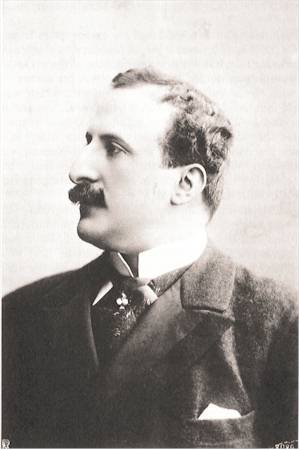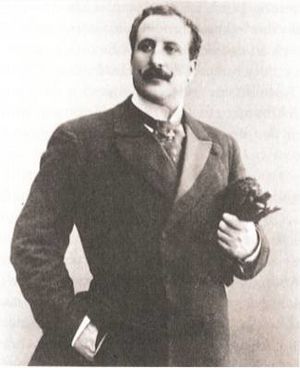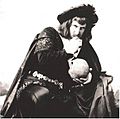Mattia Battistini facts for kids
Mattia Battistini (born February 27, 1856 – died November 7, 1928) was a famous Italian opera singer. He sang with a deep voice called a baritone. People often called him the "King of Baritones" because he was so good!
Contents
Early Life of a Star
Mattia Battistini was born in Rome, Italy, on February 27, 1856. He spent most of his childhood in a small village called Collebaccaro di Contigliano, near Rieti. His family owned a large estate there.
His family was quite important. His grandfather and uncle were doctors for the Pope. His father, Cavaliere Luigi Battistini, was a professor who taught about the human body at the University of Rome La Sapienza. Mattia went to good schools, including Collegio Bandinelli.
Even though his family was involved in law and medicine, Mattia decided to follow his passion for music. He left law school to study music. He learned about composing music from Emilio Terziani. He also learned how to sing from Venceslao Persichini. He worked with famous musicians like Luigi Mancinelli and Augusto Rotoli to make his singing even better.
Starting His Singing Career
Mattia Battistini was only 22 years old when he sang in his first opera. This happened at the Teatro Argentina in Rome. He played the role of Alfonso in an opera called La favorita by Gaetano Donizetti. This important night was on November 9, 1878.
First Performances and Tours
For the next three years, Mattia traveled all over Italy. He sang in many different operas. This helped him make his voice stronger and gain lots of experience. He performed in famous operas like La forza del destino, Il trovatore, Rigoletto, and Aïda.
In 1881, he traveled to Buenos Aires, Argentina, for the first time. He toured South America for over a year. On his way back, he sang in Spain, in cities like Barcelona and Madrid. There, he performed as Figaro in Rossini's funny opera The Barber of Seville.
In 1883, Mattia visited London, England. He sang at the Royal Opera House in Covent Garden. He performed in I Puritani with other amazing singers. He also sang with the famous soprano Adelina Patti. He returned to London later, in 1905–1906. By then, he was a very popular singer. People loved his powerful voice and his elegant manners.
Why He Didn't Sing in America
Mattia had a great success in Naples, Italy, in 1886. Two years later, he went to Buenos Aires again. But this was his last trip across the Atlantic Ocean. He never sang in South America again. He also never performed in North America, even though the Metropolitan Opera in New York wanted him to.
It is said that Mattia had a very bad experience on his 1888 trip to Buenos Aires. The ocean was very rough, and he became scared of traveling across the sea. Because he didn't sing in America, other Italian baritones became famous there instead.
The year 1888 was also special because Mattia sang for the first time at La Scala in Milan, Italy. This is one of Italy's most important opera houses. The audiences loved him so much that they asked him to come back the next season.
A Star in Russia
From 1892 onwards, Mattia Battistini became incredibly popular in Russia. He was a huge favorite at the two main imperial theaters: the Mariinsky Theatre in Saint Petersburg and the Bolshoi Theatre in Moscow. He returned to Russia almost every year, performing there for 23 seasons in total. He also toured other parts of eastern Europe, often starting from Warsaw.
Mattia traveled like a prince. He had his own private train car with servants. He also brought many trunks filled with his beautiful and fancy stage costumes. He was so respected that the composer Jules Massenet even changed a role in his opera Werther for Battistini to sing in 1902.
Mattia also sang regularly in other big European cities. These included Milan, Lisbon, Berlin, Vienna, and Paris. But his many friends in Russia and the support he got from the royal family made Russia his artistic home. This was true until World War I started in 1914.
The war changed everything. The Tsarist government in Russia was overthrown in 1917. This meant the end of the rich society that had supported opera stars like Battistini. Because of this, and his decision not to sing in the Americas, Mattia's career after 1918 was mostly in Western Europe.
Mattia Battistini married a Spanish noblewoman named Doña Dolores de Figueroa y Solís. She came from a very important family.
His Last Performances
After World War I ended in 1918, Mattia Battistini started his own singing group. He toured with them and often gave concerts. He sang in England for the last time in 1924. He gave his very last concert performance one year before he passed away. People said his voice was still strong and clear, even at the end.
His final singing performance was in Graz, Austria, on October 17, 1927. He then went back to his home at Collebaccaro di Contigliano, Rieti. He died there from heart failure on November 7, 1928.
Mattia Battistini also taught singing in his later years. Some of his students became famous baritones themselves.
His Recordings
Mattia Battistini made his first recordings in Warsaw in 1902. Between 1906 and 1924, he recorded many songs for a company called Gramophone Co Ltd. His recordings were also released in the USA. His very last recording session was in February 1924.
His earliest recordings had only a piano playing along with his voice. Later, his songs were backed by a small group of musicians and sometimes a few singers.
Mattia Battistini was considered one of the greatest singers ever. When you listen to his recordings, you can understand why he was so famous. He was very skilled at controlling his voice. He used special techniques like portamento (gliding between notes) and fil di voce (a very soft, steady tone).
His singing style was developed before a type of opera called "verismo" became popular. This means his recordings show how Italian singers performed in the early to mid-1800s. He sang with a strong, bold, and noble style.
Sometimes, he would show off his voice by holding high notes for a long time. He would also change the music a bit, which was common for singers back then. One interesting recording is "Non mi ridestar." This song was originally for a tenor (a higher male voice). But the composer, Massenet, changed it for Battistini's baritone voice. This shows how important and influential Battistini was.
Some of his most famous recordings include songs from operas like Don Sebastiano, Macbeth, Don Carlos, and Ernani. His performances from Ernani are especially famous.
Images for kids
See also
 In Spanish: Mattia Battistini para niños
In Spanish: Mattia Battistini para niños
 | Sharif Bey |
 | Hale Woodruff |
 | Richmond Barthé |
 | Purvis Young |




